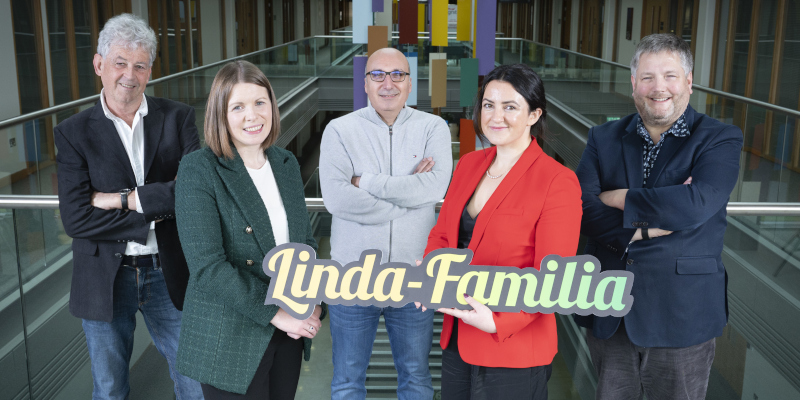In This Section
UCC-led digital health project awarded almost €5m to save lives of mothers and babies in Africa

- €4.9 million awarded by Horizon Europe to scale a digital health system for maternal and child health in East Africa.
- In 2020, 70% of global maternal deaths occurred in Sub Saharan Africa, this project aims to tackle high maternal and child mortality rates by improving early detection and care for infectious diseases - through better data and digital tools.
- Led by the INFANT Research Centre at University College Cork, the 11-partner consortium includes institutions from Ireland, UK, Norway, and Ethiopia, Rwanda, Tanzania and Uganda.
A new digital health project has been awarded €4.9 million funding to help protect mothers and children in East Africa by using smart digital tools to fight infectious diseases and save lives.
A University College Cork (UCC) led project, LINDA-FAMILIA, meaning “Protect the Family” in Swahili, has been funded under the Horizon Europe Programme to revolutionise maternal and child health in East Africa.
Led by the INFANT Research Centre at UCC, the initiative will deploy scalable, interoperable digital health systems to track infectious diseases and support health services in pregnancy, postpartum, and childhood care.
Transforming Maternal and Child Health Through Digital Innovation
LINDA-FAMILIA will implement an open source, integrated digital health information system to replace paper-based records in four priority regions: Addis Ababa – Ethiopia, Eastern Province – Rwanda, Kilimanjaro Region – Tanzania, Lango Sub-region – Uganda.
Using the free and open source DHIS2 platform, the world’s largest health information system, the project will integrate 11 World Health Organisation (WHO) recommended Digital Health Interventions (DHIs) to create country specific eRegistries. These systems will capture individual level health data on infectious diseases and vaccinations, enabling improved clinical care, disease surveillance, and public health research, at lower cost than existing systems. DHIS2 is especially suited to the LINDA-FAMILIA project as it is designed for use in low resources settings where internet coverage is unreliable. It makes use of technology freely available in sub-Saharan Africa.
The initiative brings together 11 global partner consortiums from Ireland, Tanzania, Ethiopia, Rwanda, Uganda, Norway and the UK and is coordinated by UCC, under the leadership of Ali Khashan, Professor in Perinatal Epidemiology, School of Public Health and INFANT Research Centre at UCC.
“This project addresses a fundamental gap in health systems: access to reliable, timely data,” said Prof. Ali Khashan, Project Lead. “By combining global scientific expertise with deep local knowledge, we’re building sustainable digital tools that not only improve health data systems but also support clinical decision-making in maternal and child health.”
Why this work matters: A Region Burdened by Preventable Deaths
While many countries, face challenges with outdated and fragmented digital health infrastructures, the LINDA-FAMILIA research team chose to focus on East Africa because of the urgent public health need and a strong regional momentum toward digital transformation.
Sub Saharan Africa continues to face disproportionately high rates of maternal and child mortality. In 2020 alone, the region accounted for 70% of maternal deaths worldwide, with infectious diseases such as HIV, malaria, hepatitis B, syphilis, TB, and sepsis as leading contributors. These are preventable conditions - but health systems are hindered by fragmented, siloed, and paper-based data systems.
LINDA-FAMILIA aims to correct that by enabling real time data use for evidence-based care, empowering both healthcare providers and policy makers with the information they need to deliver timely interventions:
“We see firsthand the urgent need for stronger health data systems across East Africa. By replacing fragmented, paper-based records with a scalable and integrated digital system, we can dramatically improve how care is delivered and ultimately, save lives,” says Prof. Blandina Mmbaga, Project Scientific Coordinator and Director Kilimanjaro Clinical Research Institute.
Built on a Legacy of Innovation
The project builds on the ULTRA Project, a collaboration between UCC, Kilimanjaro Clinical Research Institute (KCRI), and the Global Pregnancy Collaboration (CoLab). ULTRA successfully developed and implemented an eRegistry system in maternal and child health units across Tanzania, transforming how health data is captured and used. The ULTRA project was funded by an IRC Coalesce grant.
This work also honours the memory of the late Professor Christopher Redman (1941–2024) A great inspirer, mentor, scientist, and collaborator who made giant clinical steps forward in the field of maternal and newborn health and who contributed significantly to the early stages of this work. His inspiration and dedication live on in this project.
By building institutional capacity and ensuring integration with national health systems, the LINDA-FAMILIA project supports long-term sustainability. It aims to serve as a model for how digital health systems can contribute to universal health coverage, improved epidemic preparedness, and equitable healthcare across low-resource settings:
“This is impressive and as one of the partners we are looking forward to a successful implementation which will enable us to draw best practices for scale up,” says Dr Grace Magembe, Chief Medical Officer, Tanzania.
